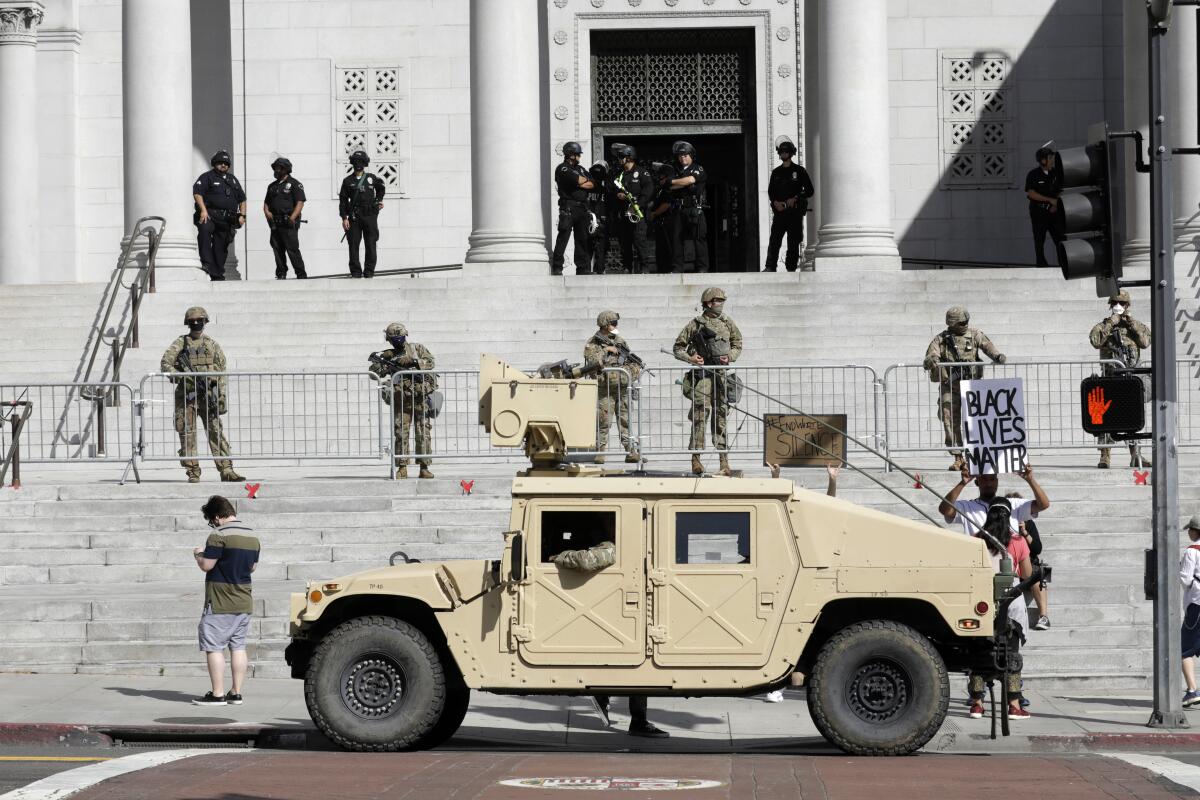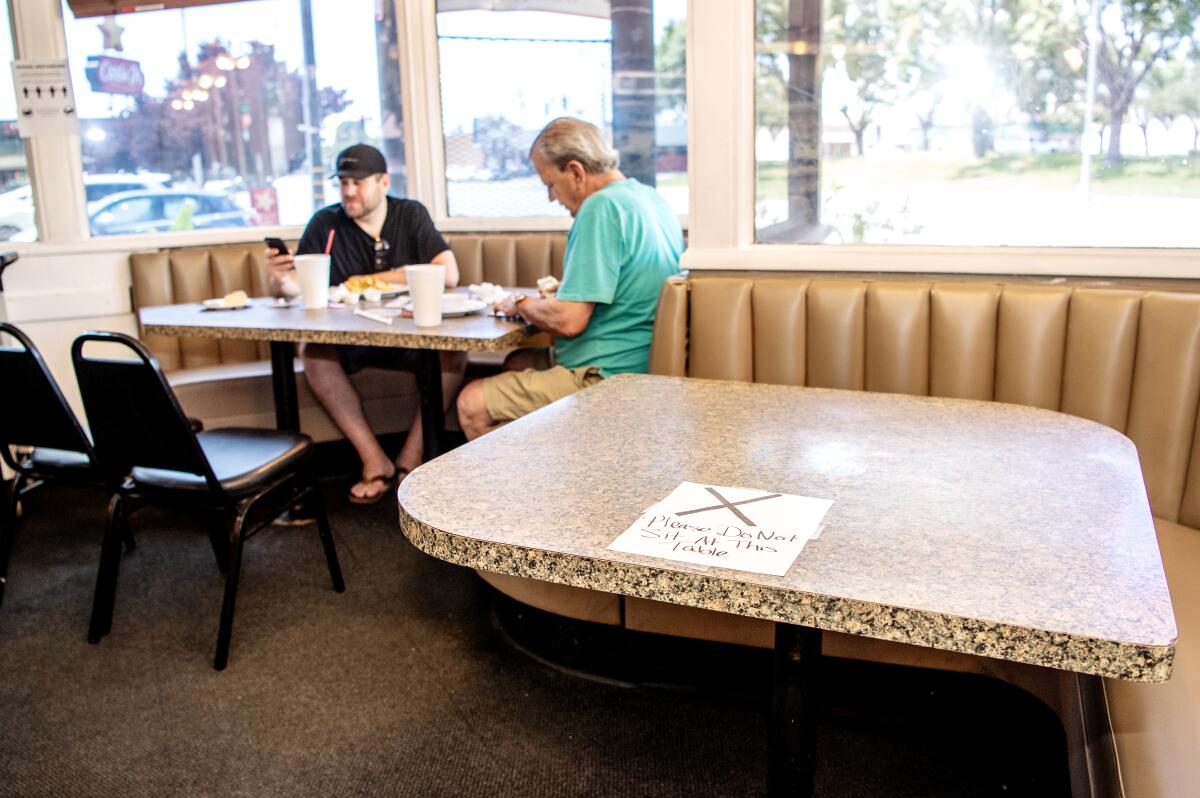Newsletter: A long weekend of unrest

Good morning, and welcome to the Essential California newsletter. It’s Monday, June 1, and I’m writing from Los Angeles.
Start your day right
Sign up for Essential California for news, features and recommendations from the L.A. Times and beyond in your inbox six days a week.
You may occasionally receive promotional content from the Los Angeles Times.
“This is not 1992,” Mayor Eric Garcetti told Angelenos on Saturday afternoon, saying he had no plans to call in the National Guard as thousands of people took to the streets to protest the death of George Floyd. Floyd, a black man, had begged for help with his neck pinned under the knee of a white police officer Monday in Minneapolis.
By mid-evening Saturday — before the city’s 8 p.m. curfew had even gone into effect — the mayor had revised his statement and asked the governor to deploy 500 National Guard troops to Los Angeles.
Gov. Gavin Newsom declared a state of emergency in the city and county of Los Angeles late Saturday night and officially activated the Guard to assist police in the region. By Sunday morning, Guard members were patrolling the streets of Los Angeles for the first time since April 1992. Surreal images showed military humvees circling past the looted Grove shopping mall and Original Farmers Market and parked outside the Beverly Center. A quartet of Guardsmen stood in front of a downtown Los Angeles MedMen marijuana dispensary in full camo fatigues.
[Read more: “L.A. reels from looting and arrests not seen in decades” in the Los Angeles Times]
Now, Californians are again waking up to assess the damage after another night of unrest in cities such as Los Angeles, San Francisco and Long Beach, despite curfews being in place Sunday night.
Los Angeles is in turmoil. Minneapolis is in turmoil. But the pain is by no means contained to a few municipal geographies. Fueled by long-festering outrage, these same scenes played out across the country. Curfews were imposed by mayors in more than two dozen cities over the weekend, marking the first time “so many local leaders have simultaneously issued such orders in the face of civic unrest” since 1968, according to the New York Times. Although large swaths of the weekend’s protests across the country were peaceful, they have also been marred by looting and fires — and violence perpetrated by protesters and police.
The mass protests have proved a vexing challenge for law enforcement agencies, as my colleagues Richard Winton and Kevin Rector explain in their story, with the LAPD facing critiques from all sides for its tactical response. With police deployed around the city, it took hours to marshal more resources for the area when the Fairfax District became the focus of Saturday’s activities — all while television cameras beamed images of businesses being looted on live TV, often without officers in sight.
[Read the story: “‘Where are the cops?’ Uncontrolled looting puts police on the hot seat” in the Los Angeles Times]
Meanwhile, protesters have said clashes between protesters and police skirmish lines were largely the result of police aggression, and questioned the department’s commitment to deescalation. The LAPD has also been critiqued for shooting protesters with less-than-lethal beanbags and rubber bullets to disperse people. Others, including the president of the union that represents LAPD officers, have said that it’s too early to judge the department’s response to this weekend’s unrest as protests continue across the city.
Moore had previously drawn praise for emphatically condemning Floyd’s killing, with the chief saying that the footage of the incident tarnished others who wear a badge and tore “at the very fabric of race relations in this country.” It’s rare for sitting police chiefs to so openly criticize the actions of an officer involved in a controversial on-duty killing, but Moore joined the heads of police agencies in half a dozen other cities across the U.S. last week in a chorus of blunt criticism.
This nationwide uprising does not follow in the wake of coronavirus disruption — it comes as the country remains in the grips of a once-in-a-century pandemic. Roughly 41 million Americans have filed for unemployment benefits since the outbreak intensified in March, when it all but shut down economies that are only just beginning to reopen. The physical toll of the virus itself has also played out in vastly unequal strokes, with extensive racial and economic disparities emerging among coronavirus victims in Los Angeles County. Officials have attributed the trend in part to systemic inequities and institutional racism.
And black Americans are still not safe in this country. Not before the pandemic, and not during it. They are not safe going for a jog, on a train station platform, getting pulled over in broad daylight for a broken car brake light or holding a cellphone. They are not even safe within the relative sanctuary of their own homes.
More coverage from Los Angeles this weekend:
- Two of L.A.’s hippest streets — Melrose and Fairfax — became targets for looting on Saturday. Los Angeles Times
- What started as a peaceful protest Sunday in Santa Monica devolved into chaos around 1 p.m., as looters smashed storefronts in the Santa Monica Place mall and other downtown businesses. Los Angeles Times
- “Sometimes peaceful is not enough.” L.A. protesters explain why they hit the streets. Los Angeles Times
- Less than 24 hours after Los Angeles County restaurants were told they could reopen for dine-in service, many were looted and vandalized. Los Angeles Times
And beyond L.A.:
- Protests in Northern California were marked by frustration and pockets of violence. As the National Guard was called to Los Angeles on Saturday night, protesters continued clashing with police in Oakland, San Francisco and Sacramento. Los Angeles Times
- A jeep ran down two women during a protest in Visalia. Video shows the vehicle accelerating directly toward two women, who were in front of the vehicle on the road. Fresno Bee
- Columnist LZ Granderson on “the special hell reserved for black journalists” covering Floyd’s killing: “The sleepless nights are a recurring theme among journalists of color who have made deaths of persons of color their unofficial beat. I haven’t slept more than six hours in nearly a week.” Los Angeles Times
- Minneapolis police fired tear gas and rubber bullets at point blank range at an L.A. Times reporter and photographer: “I’ve covered protests involving police in Ferguson, Mo., Baton Rouge, La., Dallas and Los Angeles. I’ve also covered the U.S. military in war zones, including Iraq and Afghanistan. I have never been fired at by police until tonight,” writes Molly Hennessy-Fiske. Los Angeles Times
And now, here’s what else is happening across California:
U.S. cities fear the protests may fuel a new wave of coronavirus outbreaks. Images showing thousands of screaming, unmasked protesters have sent shudders through the health community, which worries its calls for social distancing during the demonstrations are unlikely to be heard. Associated Press
L.A. STORIES
Here’s a list of more than 85 black-owned food businesses in L.A. “This is a way to put money directly into businesses that are owned by black people,” Kat Hong, the 25-year-old who created the Google spreadsheet circulating online, said. “It’s important to support these businesses every day — not just this week or until all this is over — every single day.” Los Angeles Times
“Who approved this?” Riders and officials criticized Metro’s decision to suspend service with little warning Saturday night. The transit agency apologized to passengers who were left stranded across Los Angeles County Los Angeles Times
Will small-business owners go to jail for breaking coronavirus rules? L.A. is prosecuting more than 70 businesses so far for allegedly flouting COVID-19 rules. The group includes pet groomers, salons and smoke shops. Los Angeles Times
Support our journalism
POLITICS AND GOVERNMENT
Newsom’s budget cuts would hit Californians most vulnerable to the coronavirus: Newsom has proposed sweeping budget cuts to safety-net healthcare programs ― including Medi-Cal, California’s Medicaid program for low-income people ― just as enrollment is projected to spike because of record job losses related to the pandemic. Los Angeles Times
CRIME AND COURTS
One person was arrested after eight homeless people in Huntington Beach were given poisoned food that sent several to the hospital. The poisonings occurred over the course of about a week in mid-May, authorities said. Los Angeles Times
HEALTH AND THE ENVIRONMENT
Last week, California health officials issued recommendations for universal COVID-19 testing in the state’s skilled nursing facilities, nearly six weeks after Newsom said he was prioritizing testing in those homes. But critics, including advocates for staff and industry trade groups, say that the state has merely laid out guidelines that shift responsibility onto counties and nursing homes to actually perform the testing. Los Angeles Times
CALIFORNIA CULTURE
In Bakersfield, a hungry and weary soul searches for a bite to eat: A writer seeks meaning in his diner breakfast — his first sit-down restaurant meal in nearly 10 weeks. Los Angeles Times

The coronavirus claims a beloved annual Christmas tradition in the Central Valley. Hughson-based Duarte Nursery will not hold its annual poinsettia sale for the holiday season this year. Modesto Bee
Yellowstone opens a bit more for summer, following the Grand Canyon’s lead. Yellowstone National Park, which eased into activity two weeks ago, will reopen several entrances in coming days, followed by many cabins, but the park’s campgrounds and emblematic lodges are still closed until further notice. Los Angeles Times
Welcome to Brothbush Academy, a coronavirus commune of sorts, made up of three Riverside families. The Bristows, the Roths and the Furbushes have agreed to teach their kids together and only see each other. Los Angeles Times
Chino’s Centro Basco was built on family-style dining. Can those traditions survive COVID-19? Los Angeles Times
A poem to start your week: “Tradition” by Jericho Brown. Poets.org
Free online games
Get our free daily crossword puzzle, sudoku, word search and arcade games in our new game center at latimes.com/games.
CALIFORNIA ALMANAC
Los Angeles: partly sunny, 78. San Diego: partly sunny, 75. San Francisco: partly sunny, 64. San Jose: partly sunny, 78. Fresno: cloudy, 89. Sacramento: partly sunny, 87. More weather is here.
AND FINALLY
This week’s birthdays for those who made a mark in California:
Actor Morgan Freeman (June 1, 1937), actress and U.N. special envoy Angelina Jolie (June 4, 1975), Snap Inc. co-founder Evan Spiegel (June 4, 1990), developer and philanthropist Eli Broad (June 6, 1933) and music mogul L.A. Reid (June 7, 1956).
If you have a memory or story about the Golden State, share it with us. (Please keep your story to 100 words.)
Please let us know what we can do to make this newsletter more useful to you. Send comments, complaints, ideas and unrelated book recommendations to Julia Wick. Follow her on Twitter @Sherlyholmes.
Start your day right
Sign up for Essential California for news, features and recommendations from the L.A. Times and beyond in your inbox six days a week.
You may occasionally receive promotional content from the Los Angeles Times.



